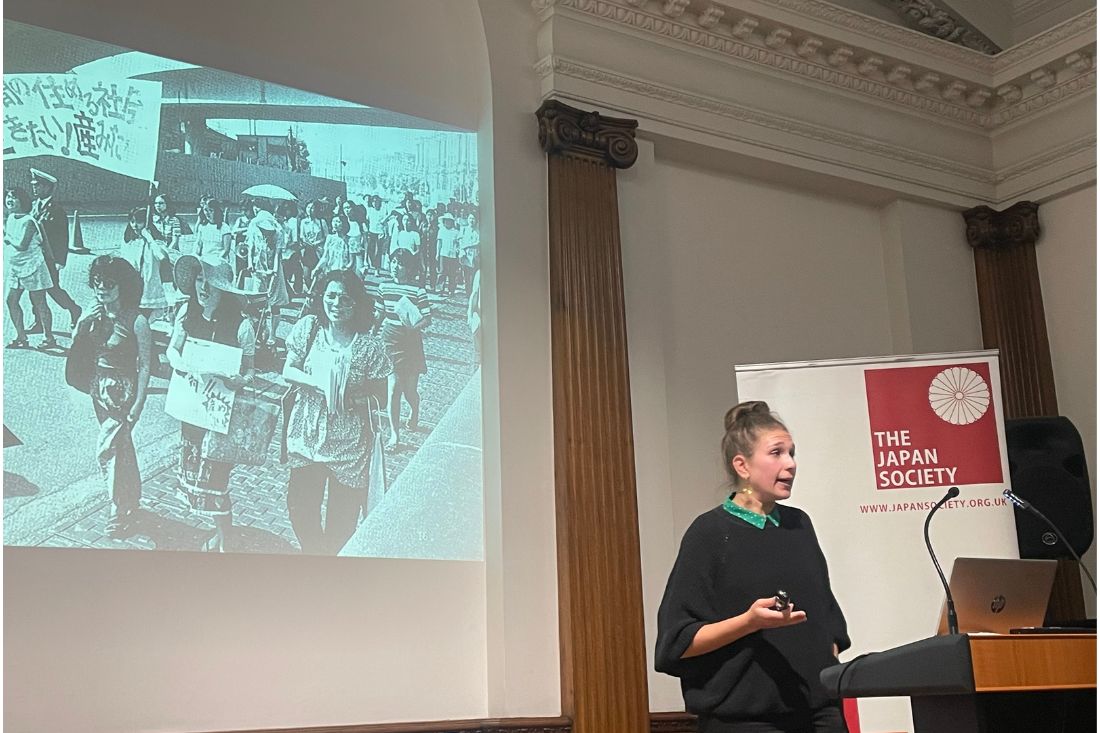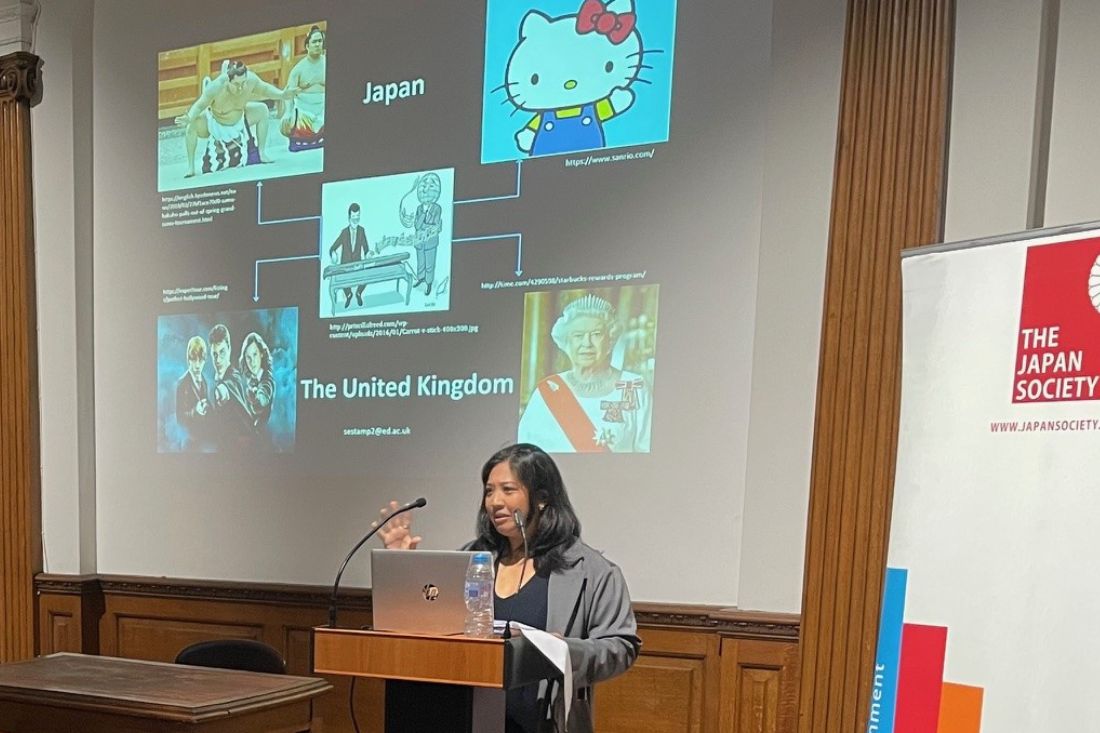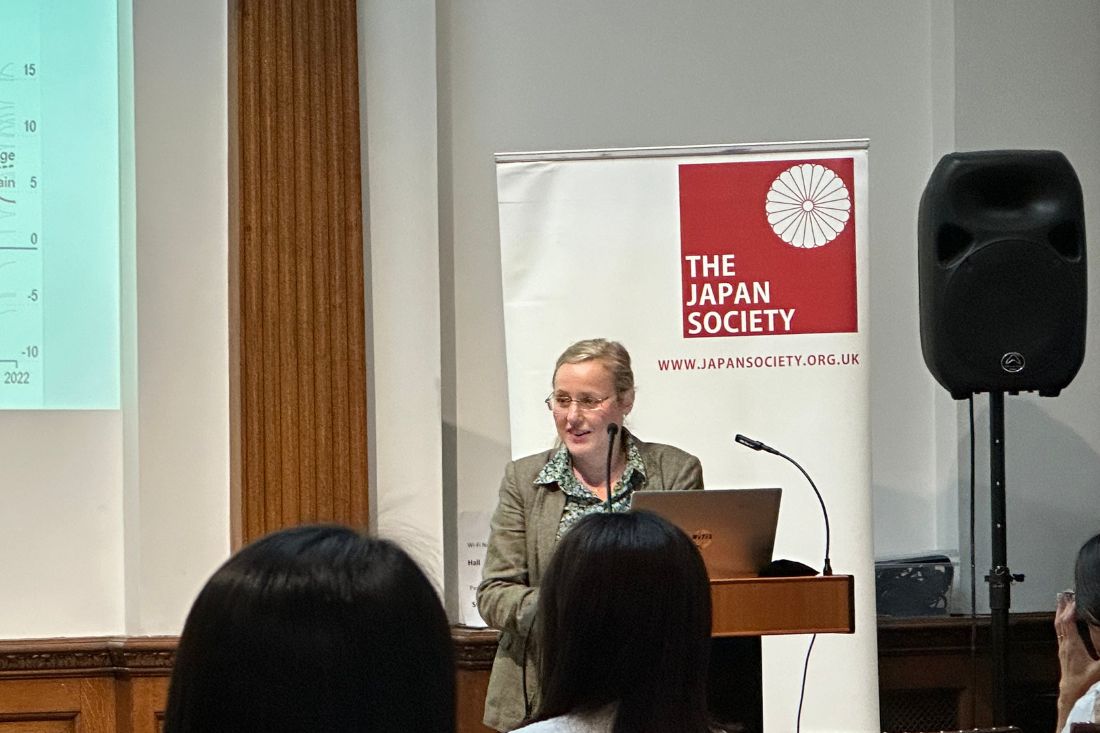The Japan Society Public Lecture Series: April - June 2024

The Japan Society Public Lecture Series hosts monthly lectures delivered by academics and experts on specialised subjects related to Japan and Japanese studies. Lectures are free and open to all at the Swedenborg Society in central London. In April, May, and June 2024, we featured an engaging line-up exploring topics such as women's liberation and disability activism in Japan's reproductive justice movement, the cultural influence of the JET Programme, and gender disparities in higher education and economics between Japan and the UK.
We would like to thank our speakers Dr Anna Vittinghoff, Dr Sharleen Estampador and Dr Liliana Harding and everyone attending the lectures. Special thanks to the Toshiba International Foundation for their support.
Below is a review of the lectures conducted in April, May, and June 2024.
Click here for upcoming lectures and Join The Japan Society Mailing List to stay informed of future events.
Japanese discourse on reproductive justice goes beyond bodily autonomy based on gender and sexuality due to the presence of disability activists and their key participation in reproductive politics. Building on her PhD research, in this lecture Dr Anna Vittinghoff, a lecturer in East Asian Studies at the School of East Asian Studies, University of Sheffield shared her analysis of the impact of the collaborative efforts of disability and women’s liberation activists in the 1960s and 1970s.
Dr Vittinghoff began by outlining the bioethical consequences of the Eugenic Protection Law (which had the goal of preventing the birth of “eugenically inferior offspring”) and the effect it had on how human life was valued in Japan. Following later debates surrounding the expansion of this law, social activism surrounding the state intervention in women’s bodies began to grow. At the same time, the critique of the subsequent devaluation of disabled lives led to an important challenge to Japan’s biopolitical order.
Dr Vittinghoff observed how, unlike in other countries, this placed disabled women at the forefront of reproductive justice discourse, leading to a powerful collaboration between the two movements. This was not without its challenges, and so Dr Vittinghoff proposed that the life and work of the women’s lib activist Tomoko Yonezu could be used as a lens for the intersectionality of the combined movement, as “her struggle of where to position herself in the reproductive debate and her reconciliation of both her embodied identities illustrates the tensions that formed the biggest hurdles for feminists and disability activists to overcome to collaborate on the issue”.
Although the common perception in Japan is that the women’s lib and disability movements of the 1960s and 1970s were experimental and without lasting effect, Dr Vittinghoff effectively argued that Yonezu’s work was crucial in the creation of emancipatory spaces in the 1960s and 1970s. These ensured women’s lib and its critiques became more than a short-lived experiment in radical feminism in Japan.
In this lecture Dr Sharleen Estampador of the School of Social and Political Science at the University of Edinburgh demonstrated how the Japan Exchange and Teaching (JET) Programme (a teaching program inviting university graduates to Japan for positions in local governments and educational boards) has been beneficial in changing international attitudes towards Japan.
Dr Estampador first described the concept of soft power, and its role in bridgebuilding between nations. Soft power is an approach to international relations that uses economic or cultural influence to, in Dr Estampador’s words, “make another country attracted to what your country has to offer”.
Using an autoethnographic approach, she explored the effect of this from a Western perspective, focusing on how soft power can emerge on a localised level. She noted the effects of university graduates living in Japan during a personally formative period; experiencing the realities of everyday life in host communities and adapting to a new culture as a young graduate coming to terms with their own identity eventually becomes fond memories and, later, a strong sense of nostalgia.
Dr Estampador noted that the time after the completion of the programme was key. Reflecting on her own experiences as a North American Filipina in Japan, she described the ways in which a person’s personal identity can change when adapting to a new culture, and how this can contribute to the positive, yet subtle, spread of Japanese culture. Dr Estampador went on to provide several examples of previous participants in the programme, who returned to their home countries and found themselves gently educating those around them about Japan, enthused to talk about their positive experiences.
In this lecture Dr Liliana Harding, associate Professor in Economics at the University of East Anglia, offered insight into an area in which women are grossly under-represented. Using comparative data from the UK and Japan, Harding presented a gendered snapshot of the economics field, and the significance of gender in economic research.
Using comparative data from the UK and Japan, she found that, while female students represent more than half of the university student population in the UK, less than 30% of UK domiciled students studying economics are female. This is similar to Japan, where female economics students only make up 25.98% of the economics student population.
Dr Harding particularly focused on the research of macroeconomists gender disparities, and the cultural factors that are often not considered. Although there is a higher level of female participation in the workforce, it is important to look at the kind of work being done. Part time work is very female dominated, and the choice between work or family is too often informed or constrained by a society that places women as caretakes.
Consequently, they carry the majority of what Dr Harding described as the ‘double burden’ (those that must work but also have a responsibility for unpaid domestic labour). Harding used the example of female academics in Japan, who carry 68% of the burden of household work, while at the same time government policies provide incentives for women to stay in part-time work (e.g. if a working married woman reaches the so-called ‘1.3 million yen wall’ in her wages, her husband is required to start paying higher taxes). This unequal division of domestic responsibilities is a common trend in many countries.
Harding concluded by underlining the importance of female-led economic research. In addition to providing a balanced economic perspective and research diversity, women have been found to be more likely than men to research topics such as health and education; areas which are highly valued by society. However, Harding ventured that most initiatives to support women studying economics have been unsuccessful, as they do not sufficiently address the causes behind the unique challenges faced by women.
Supported by the Toshiba International Foundation (TIFO)





